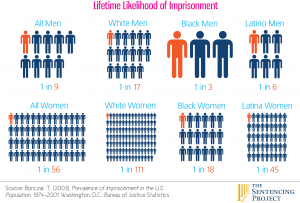The Death Penalty is Justified as Retribution
Arguments for the death penalty frequently cite retribution as a justification for the practice. However, in many cases executions cause greater harm to victims’ families than they do comfort. A 2012 study compared victim’s families in Minnesota and Texas, a life without possibility of parole state and a death penalty state, respectively. The study examined the way survivors were able to cope with the loss of their loved one and how quickly and well they had recovered and moved on. It concluded that “in Minnesota, survivors of adjudicated cases show higher levels of physical, psychological, and behavioral health” than those in Texas (Marilyn). This small scale study suggests that sentencing defendants to life without parole allows families to heal better than executing them does. This is because evidence indicates that executions ultimately offer little closure:
“Although the social expectation is that avenging a wrongdoer will relieve anger and that higher punishment will lead to a better mood, experimental studies show the opposite. A study on punishment found that the dorsal striatum, the brain region that is closely related to pleasure, was activated when participants decided to punish a violator of a social norm, but a subsequent study showed that the predicted and experienced emotion were substantially different. Specifically, after the punishment was administered, these participants were substantially less happy than those who did not punish. This is because these participants who punished continued to ruminate about the violator” (Marilyn).
Accordingly, terminating use of the death penalty would help families move on and achieve much needed closure.

Source: https://www.denverpost.com/2017/11/16/denver-adoption-day/
Racial Minorities Commit More Crimes
One explanation for the racialized nature of death penalty sentencing is that minorities simply commit more crimes and more violent crimes as well, and are therefore more likely to be prosecuted accordingly. However, in 2012 49.4% of murders and nonnegligent manslaughters were committed by black people versus 48.2% committed by white people (FBI). A study in Washington state found that “juries were four and one half times more likely to impose a sentence of death when the defendant was black than in they were in cases involving similarly situated white defendants” (Beckett). Black defendants face significantly more prejudice in the justice system than white defendants, and should not be sentenced to death at a disproportionate rate because of this. While the law appears to be neutral, it is not so in its imposition and therefore is discriminatory and unethical.

Source: https://www.attn.com/stories/2419/racism-in-american-criminal-justice-system
Wrongful Convictions Never Happen
Some people, such as the late Justice Scalia, have argued that wrongful convictions in capital cases never happen. However, this is untrue. There is a known error rate and individual cases such as Earl Washington’s are emblematic of a larger population of wrongfully condemned people who have been sentenced to die. Those who promote the use of the death penalty would disagree that it infringes upon the presumption of innocence principle. One safeguard, they might argue, is the standard of proof. For criminal cases, this is beyond a reasonable doubt. This is the highest burden of proof in our legal system, and it rests solely on the prosecution to prove the elements of the crime. This may be considered a gatekeeper to preventing wrongful convictions. However, prosecutorial misconduct, coerced confessions, unreliable eyewitness testimony, racial or ethnic biases and ineffective counsel may all contribute to a conviction despite the high standard of proof (New England Innocence). These factors may lead to wrongful convictions despite safeguards and implicitly shift the burden to the defense. This creates a culture of assumption of guilt rather than innocence that is dangerous and unacceptable when the death penalty is being pursued.
Abolition of the Death Penalty Should not Affect those Already on Death Row
While some people oppose the death penalty, they still argue that its eradication should not be retroactive. This means that it would not apply to people who had already been convicted and were on death row, but simply would prohibit the sentence in the future. It is incumbent upon activists to correct this position and guarantee that abolition is retroactive and will apply to those already on death row. For example, proposed legislation in Utah “would ban the state from seeking the death penalty for aggravated murder committed after May 7, 2018” but “it would not affect the nine men on Utah’s death row now” (Romboy). This is problematic. If the objection to the death penalty is based on ethical reasons and because of its problematic use, we are obliged to ensure the law is retroactive as well, sparing current death row prisoners from this cruel and unusual punishment.

Source: http://www.ncadp.org/blog/entry/an-untold-story-women-on-death-row2
